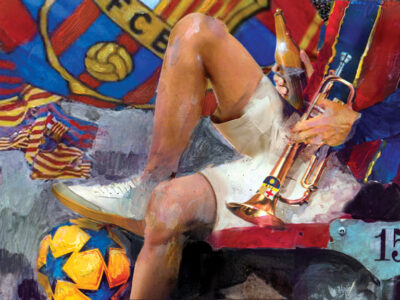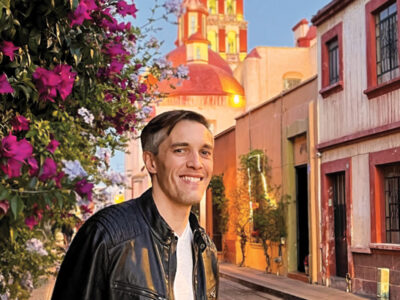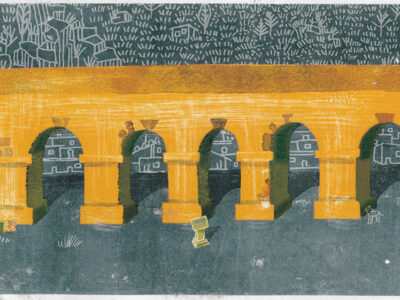Billed as “the world’s largest brainstorming event,” the World Economic Forum’s Summit on the Global Agenda, held November 7-9 in Dubai, brought together 700 of the world’s leading thinkers—including Penn President Amy Gutmann and more than a dozen University faculty—for three days of discussions aimed at proposing “breakthrough ideas” to address critical global issues, starting with the deepening financial crisis.
As a member of the WEF’s Global University Leaders Forum, Gutmann was invited to participate in the conference, as well as to nominate Penn faculty for inclusion. “So, quite a large contingent of Penn faculty were invited to Dubai by WEF and by the government of Dubai, and we participated in an impressive array of problem-oriented panels,” Gutmann explains. The global-agenda councils “are multi-stakeholder, multi-disciplinary groups that are brought together to tackle some of the world’s largest problems.”
(There were plenty of Penn alumni among the participants as well, Gutmann adds, “who were coming up and saying, ‘Boy, it was great to meet these Penn faculty members; it made me feel like I was back’” on campus.) In all, 60 separate councils were convened to focus on seven broad areas, from economic development and growth to technology and innovation. The reports and recommendations they generated are designed to inform the next iteration of the WEF’s signature annual gathering in Davos, Switzerland, scheduled for January 28-February 1, the theme of which is “Shaping the Post-Crisis World.”
Sixteen faculty members were involved in the councils, with 11 making the trip to Dubai for the summit. Gutmann and Tukufu Zuberi, professor and department chair in sociology and director of the Center for Africana Studies, co-chaired the council on human equality and respect. Wharton Professors Michael Useem and Howard Kunreuther [“Insuring Against Terror,” July|Aug 2005] co-chaired the council on mitigating natural disasters, while Wharton Dean Thomas Robertson co-chaired one on marketing and branding. Christopher Murray [“Proof of Concept,” Sept|Oct 2008], a Penn Integrates Knowledge professor with appointments in the departments of chemistry and materials science, chaired a group looking at the challenges of nanotechnology.
By the time the gathering was being planned, it was clear that the global economy was in a “fairly long-term slump,” says Gutmann, but “we did not know it would go into a prolonged tailspin.” The developing crisis “made our deliberations all the more purposeful.”
Gutmann and Zuberi’s group concluded that focusing on issues of discrimination, while especially challenging, is also especially critical in times of crisis—“because discrimination fosters mistrust, because it is an obstacle to bringing the most creative minds together to bear on solving an economic crisis,” she says.
Many other groups shared that view. As part of the summit process, members of the various councils requested that their issues be integrated into other groups’ discussions, and “we were visited by almost every group,” Gutmann says. The consensus was that it was far harder to move forward on solutions to a wide range of problems, from the financial crisis to water access, “in a context where there is discrimination, hatred, and violence, than when people can come together,” she adds. “So the upside of non-discrimination and inclusion—our goal was to find practical means to move that way—is maximizing creativity and innovation in both economic and political realms, which we desperately need.”
In addition to helping shape this year’s Davos meeting, the council reports (available through the WEF website—weforum.org—and on YouTube) “should also be a useful tool for students and other interested scholars to aid in deliberation about these critical issues,” says Gutmann. “I also hope they’ll encourage more people to get involved across conventional disciplinary [and] stakeholder lines, and discuss some of the best practices for addressing issues as serious as the financial crisis or the kind of violence we’ve seen in the world because people simply can’t respect one another.”
In a video clip, Zuberi noted that “the essential point that we wanted to present, and the breakthrough idea that we have, is that when we look at the world today, we see a world which has really suffered as a consequence of not exploiting its entire pool of talent, of not pursuing the advances which could be made by individuals who heretofore have been excluded from full participation in society.”
In her interview segment, Gutmann listed the committee’s three main recommendations: Developing systems of education that combat not only ignorance but also divisions in society, and that emphasize the importance of collaboration; the creation of “councils of inclusion” at every level and type of decision-making body to insure a voice and show respect for excluded groups; and fostering “ethical leadership,” in which leaders would become “talent scouts for the talented who were previously excluded, not seen as potential leaders.”
From the University’s perspective, the summit represented “a test of our ability not simply to profess the integration of knowledge and to practice it here on campus and here in Philadelphia, but of whether it resonated on a more global scale—and it did,” Gutmann says. “For Penn’s reputation and for our commitment to the integration of knowledge, this Dubai conference was a great affirmation.”
—J.P.




